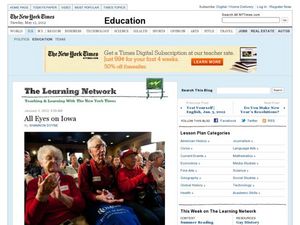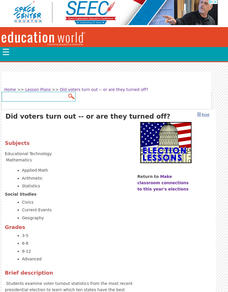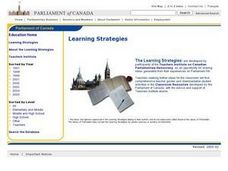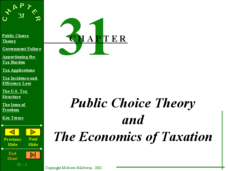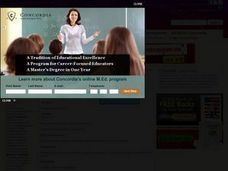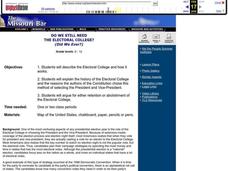Curated OER
All Eyes on Iowa
Guid your learners as they become informed members of our community. They'll consider each of the seven questions as they read the New York Times article "All Eye on Iowa." This article relates topics dealing with the 2012 presidential...
Curated OER
Cartoons for the Classroom: Campaign Echoes
Get on those thinking caps, because your class is going to analyze a political cartoon related to the 2008 presidential elections. Included is a large image of the cartoon, background information, and three guiding questions which can be...
National Endowment for the Humanities
The 1828 Campaign of Andrew Jackson: Expansion of the Voting Base
Students give examples to indicate how the franchise was extended and limited in the first half of the 19th century, and cite some differences in the newly enfranchised population that could affect the way they would vote.
National Endowment for the Humanities
The 1828 Campaign of Andrew Jackson: Changes in Voting Participation
High schoolers give examples to indicate how voting participation changed in the first half of the 19th century, and make connections between changes in voting participation and the results of the election of 1828.
Curated OER
Did Voters Turn Out -- or Are They Turned Off?
What was the voter turnout at your last state election? Examine voter turnout statistics from the most recent election to learn which ten states have the best turnout record. This lesson offers election data, handouts, and worksheets.
Curated OER
INVITING CANDIDATES TO CLASS
Students explore the election process by researching politcal platforms, inviting candidates to speak, surveying registered voters, and running a mock election.
Curated OER
The Voting Game
Upper graders play the voting game to help them understand voting patterns, political movements, and build a content specific vocabulary. Each student creats a chart to determine if his or her political view veers liberal or...
Curated OER
The Presidential Campaign Game
Upper graders play a game as a way to facilitate understanding of US Presidential Campaign issues and strategies. After being divided into small groups, a candidate will be chosen to run for office. Each group creates propaganda to get...
Curated OER
Jacksonian America and the Indian Removal Act of 1830
Students utilize primary sources to explore the national climate concerning Native American Indians during the Andrew Jackson administration. They are presented with opinions for and against the Indian Removial Act of 1830 as they...
Curated OER
When Art Conveys a Political Message
Twelfth graders learn art is an effective way to convey a political message. They learn how political messages are created to convey a message. They analyze a piece of artwork and then write a short paragraph from the point of view of...
Curated OER
Voter Turnout
Explore politics by analyzing the voting process. Pupils discuss the purpose of casting votes in an election, then examine graphs based on the data from a previously held election's turnout. The lesson concludes as they answer study...
Curated OER
The Nominating Process
Ten questions engage students in thinking about what they have read. They are quizzed on basic concepts related to the nomination process and primary elections.
Curated OER
Social Movements and Constitutional Change: Women's Suffrage
The class analyzes a series of documents intended to show the events that lead to women gaining the right to vote. They play a Tic-Tac-Toe style game, make a time line with sequencing cards, and review the 4 steps of social change....
Curated OER
Public Choice Theory and The Economics of Taxation
Let your students know how our economy works, what taxation is, and how Public Choice Theory affects the economics of taxation. This is a comprehensive and well defined presentation that includes links to additional information provided...
Curated OER
The Constitution and the Right to Vote: Ch 6
The US Constitution dictates which members of society have the right to vote. After reading about amendments extending voting rights, your class answers these questions on the 15th, 14th, and 23rd amendments. Use as a quiz or to guide...
Curated OER
Your Vote Counts!
Students build an election campaign around their favorite TV characters. They acquire knowledge about candidates, slogans, qualifications, and voting using the activities in this lesson. Thus, they simulate the election process.
Curated OER
Women Get the Vote!
Students research the history of United States voting rights to describe and analyze why voting rights and responsibilities are important. They investigate famous suffragists like Susan B. Anthony and then create a "wanted" poster and...
Curated OER
Who Can Vote? Chart
Students become familiar with historic and contemporary issues connected to voting rights around the world. They research the voting rights history of their country and then compare information about voting rights in at least three...
Curated OER
Voting and Elections: Vote to Make a Difference
Students use a ballot to make a choice about two items to vote on. For this voting lesson plan, students discuss comparing choices between two items, the benefits and drawbacks to each, and make tally marks to total the votes.
Curated OER
Race and Voting in the Segregated South
Students examine the history of African American voting rights. In this voting rights lesson, students listen to a lecture on African American voting rights between the years 1890 and 1965. Students respond to discussion questions...
Curated OER
Ohio Statehouse History
Fourth graders examine the history of the Ohio Statehouse and order the major historical events in its development. The lesson traces the development from the time of Ohio's vast wilderness to the house's completion in 1861.
Curated OER
Special Interests: How Would A Legislator Vote?
Young scholars act as elected officials who must make decisions that will make someone unhappy. They consider five bills that are up for vote in light of the contributions that many special-interest groups made to their campaigns....
Curated OER
Inform Your Vote
Students examine and participate in the election process, analyze current event topics and offer their opinions. They then share their viewpoints on civic issues. They are encouraged to do additional research on the election's hot issues.
Curated OER
Do We Still Need the Electoral College?
One of the most confusing aspects of any presidential election year is the role of the Electoral College. Learners read a bit about how the Electoral College works and then they hold a mock election in their classroom. They'll redraw a...
